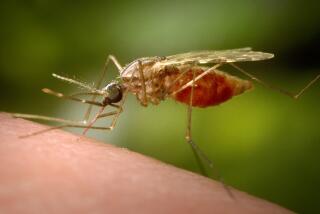Tests of AIDS Vaccine Called Promising : Medicine: Team of scientists is encouraged by tests with guinea pigs. Other researchers urge caution.
- Share via
A team of San Diego and New York scientists has found that an AIDS vaccine tested on guinea pigs provides greater protection against a variety of HIV strains than other vaccines tested so far--a development that could help pave the way for an AIDS vaccine for humans, according to a study released today in a scientific journal.
The immune response in the guinea pigs was “100 times better than what we’ve seen before,” said Flossie Wong-Staal, an author of the study published in Science and a professor of medicine and biology at UC San Diego School of Medicine.
On the basis of this study, Wong-Staal--one of the nation’s most best known AIDS researchers--predicts that a vaccine could be available for testing on humans in two years. Other experts, however, say it’s more likely to be a decade before a vaccine is ready.
“This is a a very important step forward in possibly solving some problems in vaccine development,” said Wong-Staal, who cloned HIV in 1984 and was the first to analyze its molecular makeup.
Wong-Staal and her colleagues, like others who are attempting to develop an AIDS vaccine, focused on a snippet of the HIV cell on the virus’ outer envelope. The makeup, or amino acid sequence, of that snippet shows up in many HIV strains--making it a valuable target for a vaccine.
Wong-Staal, Dr. D.J. Looney of the San Diego Veterans Administration Medical Center, and other team members devised an eight-armed synthetic version of the snippet. Three-and-a-half years ago, they injected this synthetic protein material into two guinea pigs.
Acquired immune deficiency syndrome is a viral disorder that attacks the body’s immune system, leaving it vulnerable to cancers and infectious diseases. With a vaccine, scientists are attempting to stimulate the body’s immune, or its defense system, to ward off the deadly disease.
But researchers trying to concoct a vaccine have been stymied by the same problems:
* Not all strains of HIV are the same. In fact, there are hundreds of strains, said Dr. Michael Gottlieb, assistant clinical professor of medicine at UCLA.
* Among test animals, the immune response has been short-term, lasting a few months, Wong-Staal said.
* Maintaining a high enough level to generate sufficient immune response to ward off the onslaught of the AIDS-causing virus, HIV.
* How test animals respond is not necessarily how humans will respond.
But, in the recent study, the guinea pigs showed a high level of response, and the vaccine appeared to work against more than one strain, Wong-Staal said.
“The immunity in the animals remains high after 3 1/2 years,” she said. “What we see is an ability of the protein to get a response. . . . It seems to be a very long-term response.” Scientists welcomed the development in what has been a lengthy search for a vaccine to battle AIDS, which has eluded researchers for a decade.
“The bottom line would be yes, this is promising,” Gottlieb said. “It’s exciting that they have attacked this problem at the molecular level, and it’s a very serious approach to vaccine generation.”
Researchers have also injected about 20 guinea pigs, as well as some monkeys, Wong-Staal said, “And we are seeing data along the same lines.”
While the level of response is particularly high against one strain, it is lower against the others, she said, “so there is discrimination.”
That very attribute, some caution, could prove to be a flaw of the vaccine.
“That is a potential weakness,” Gottlieb said. “The fact that it is more reactive to some than others might reflect weakness; a person vaccinated might not have protection against, for example, strain 10.”
Other scientists, including Jonas Salk, are also pressing forward with vaccine research. But so far a vaccine remains elusive, and experts urged caution in interpreting the development reported in Science.
“A safe estimate is that it will take a decade before we have a vaccine,” said Dr. Alexandra M. Levine, professor of medicine and chief of hematology at the USC School of Medicine. “A very optimistic state is that it would be five to seven years, but there is work going on.”
Wong-Staal and Looney co-authored the study with C.Y. Wang, M.L. Li, A.M. Walfield and B. Hosein of United Biomedical Inc. in Lake Success, N.Y.





